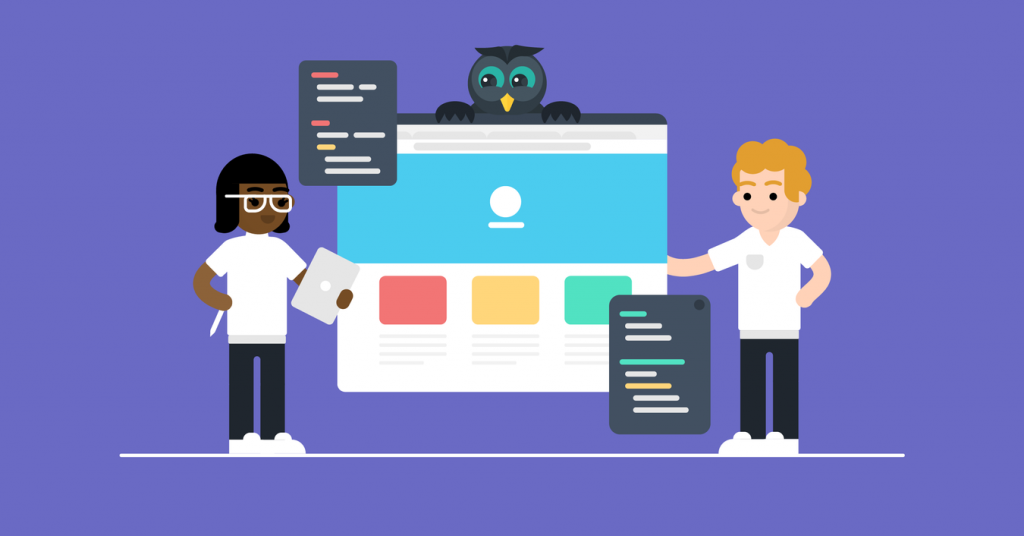
Since the booming of the Internet at the end of the 20th century, we all have witnessed a resulting rise in websites. According to the U.S. Bureau of Labor Statistics (BLS), the projected growth rate for web developers in the U.S. from 2022 to 2032 is 16%, much faster than the average for all occupations. Furthermore, the global developer population is expected to reach 28.7 million people by 2024, an increase of 3.2 million from the number seen in 2020. This indicates that web development is becoming a promising and sought-after job in the market.
You may think of becoming a web developer and plan to learn one or two coding languages. However, do you ensure that you fully understand what a web developer does? This article will detail the main role of web developers and provide a comprehensive guide to starting this career path. Let’s find out in this article with Designveloper.

What Is a Web Developer?
Web developers are programmers who engage in the development of websites and web applications by using programming languages such as JavaScript, Java, PHP, or Python that make sites operate properly. They build websites that not only satisfy the demands of end-users but also enable them to be attracted and navigate easily. Companies now can employ either full-time, part-time, or freelance web developers for different projects.

When web developers perform behind-the-scenes activities that particularly focus on web servers to deliver database information to browsers, they are called back-end developers. Meanwhile, front-end web developers work in browsers and identify what end users will see in the interface part. Besides, those working on both client and server sides are known as full-stack web developers.
What Does a Web Developer Do?
Going further into what a web developer exactly does, you’ll find out his or her main duties and daily routines. However, the roles of web developers may vary in the different companies they work on. Today’s post will list the main and daily responsibilities you’ll take, regardless of your web developer job.
1. Main Responsibilities
- For back-end web developer: Use back-end server languages (e.g. PHP, Python, Ruby, or Java) to construct databases and design the architecture of websites or web applications;
- For front-end web developers: Use front-end Javascript frameworks and libraries (e.g. Vue.js, React Native, Backbone.js, or Angular) to add functionality to sites and design smooth UIs;
- Meanwhile, a full-stack web developer is liable for those tasks above;
- Fix bugs and issues regarding the performance of websites or web applications;
- Peer view a development team’s work and deliver prompt feedback to guarantee the code’s cleanliness.
- Develop Application Program Interfaces (APIs) to make sure the fluent data exchange between applications;
- Work with different stakeholders to check the project’s progress and add new features to websites (if any) to ensure their performance;
- Perform maintenance and improvement activities to avoid unpleasant user experiences;
- Update new and advanced technologies, frameworks, and trends, then share with colleagues.
2. Daily Tasks
- Receive new projects, analyze client requirements and suggest possible solutions;
- Create parameters for new web applications or websites;
- Cooperate with other development team members such as business analysts, web designers, project managers, and other stakeholders to develop functional websites;
- Test bugs and performance errors;
- Receive feedback from clients and testers, accordingly fix bugs or errors
- Maintain and update websites regularly to improve user experience;
- Proofread coding of coworkers;
Recommended reading: How Much Does Google Pay Their Software Engineers?
3. How Much Does a Web Developer Make?
Ever wondered about the earnings of web developers in the US? According to Glassdoor, the average yearly income stands at $81,957, inclusive of a base salary of $77,367 and an additional $4,589 from commissions and bonuses.
The US Bureau of Labor Statistics (BLS) paints a promising picture for the future of web developers and digital designers, projecting a 23 percent job growth by 2031. If you’re mulling over career choices, this insight could guide you in determining whether web development aligns with your aspirations.

For those seeking specific figures, Glassdoor provides the latest median annual salary data for front-end web developers, updated as of October 11, 2020.
Even for freelancers, web development in the US proves lucrative, with an average annual income of $75,430. However, for newcomers without a substantial portfolio or experience, landing high-paying projects may pose some challenges.
Recommended reading: Web Developer Salaries in Vietnam 2022
How to Become a Web Developer?
Similar to other occupations, those who wish to become skilled web developer need to devise a detailed plan in pursuit of this career, ranging from choosing their favorite programming languages, and preparing for essential qualifications and skills to identifying when they can complete a course and seek a job. Here are four fundamental steps you should follow to become a web developer in the future:
Determine What Kind of Web Developer You Prefer
Which web developer jobs are you aiming at? The front end, Back end, or Full stack web developer? Key roles and necessary coding languages for kinds of web developers are rather different. For example, a recruiter who needs a full-stack web developer may require applicants to show their proficiency with both front-end languages such as HTML, CSS, or JavaScript and server-side languages such as Python or Ruby. If you have experience with only client-side technologies, you cannot be chosen for the position. Therefore, you initially should determine which aspect of web development you’re more interested in and good at.
Required Qualifications
Many companies don’t require which qualifications you should have to apply for a web developer position. They value your outstanding knowledge and skills over bachelor’s degrees. Having said that, it doesn’t mean that no web developer certification and qualification are important, especially for freshers.

Accordingly, entry-level web developers should hold at least a bachelor’s degree in Computer Science, Management Information Systems (MIS), or related fields. If you don’t spend much time on tertiary education, you can enroll in short-term courses or boot camps to get some web developer certification.
Soft Skills
Working on computers doesn’t mean you don’t need to communicate with human beings. Therefore, a web developer today is required to have decent soft skills to interact with his/her team members and clients effectively. These skills include:
- Detail-oriented skills;
- Decision-making and problem-solving skills;
- Logical analysis;
- Can work independently and work in groups;
- Ability to multitask – that is, to participate in several projects at the same time;
- Ability to have responsibility and capability for getting projects done on time;
- Communication and negotiation skills to discuss with colleagues, customers, and superiors;
Promote Yourself with Online Portfolios
Saying is much easier than doing. This means you cannot persuade recruiters that you’re an excellent candidate by only showing your academic results. A web developer portfolio is always essential to prove your capabilities. Like a website, it should facilitate navigation and provide sufficient information for companies to know you’re well.
Frequently Asked Questions
1. What is the difference between a web developer and a web designer?
Understanding the nuances between a web developer and a web designer is paramount. Although these roles share a close kinship, they pivot around distinct facets of website craftsmanship.
Think of web designers as the architects of the digital realm. Their canvas encompasses the aesthetics and ambiance of a website, delving into realms such as layout, color palettes, typography, and user interfaces. Their aim? Crafting visually captivating and intuitively navigable designs that elevate the user experience to seamless heights. Armed with tools like Adobe Photoshop and Illustrator, they sculpt digital masterpieces that beckon exploration.
Conversely, web developers assume the mantle of builders in this digital landscape. Tasked with translating the design blueprints fashioned by web designers into functional realities, they are the architects of code. Web developers breathe life into websites, meticulously crafting the lines of code that bestow functionality. Their domain spans feature implementation, cross-browser and cross-device compatibility, and the fine art of optimizing loading speeds to ensure swift access to digital destinations.
2. How long does it take to become a web developer?
The time to become a web developer varies based on your chosen education route. Boot camp courses can be completed in as few as three months, providing quick and focused learning. On the other hand, degree programs may take several years for a more comprehensive understanding. For self-learning, the duration is variable and depends on individual commitment and study intensity.
In terms of a career transition into web development, the average time is around a year. While some may transition faster, others may take a bit longer. The key factor influencing success is the effort and commitment put into the learning process.
3. Are web developers in high Demand for 2024?
Web development stands as a dynamic realm, a domain brimming with opportunities, as illuminated by the U.S. Bureau of Labor Statistics. Their projections paint a vibrant picture: a striking 16% surge anticipated from 2022 to 2032 for web developers and digital designers, a figure towering over the average growth across all professions. Such robust expansion serves as a clarion call for adept individuals to step into this thriving landscape.
Year after year, the stage is set for an influx of approximately 19,000 job openings, eagerly awaiting the arrival of skilled web developers and digital designers. This steady stream of opportunities underscores the unwavering demand for proficient professionals in this sector. In the vast expanse of the United States, around 197,100 developers find their niche within the web development ecosystem, reaffirming its pivotal role within the job market.
Peering into the horizon, the industry unveils a tapestry woven with promising threads of growth, poised for a remarkable 23% expansion from 2021 to 2031. This trajectory of growth outpaces that of myriad other vocations, highlighting the enduring thirst for expertise in the realm of web development.
4. Is it hard to become a web developer?
Embarking on the journey to become a web developer mirrors the ascent in any profession, rife with its unique array of trials and triumphs. It beckons forth dedication, a generous investment of time, and a steadfast commitment to the craft. Yet, the labyrinth of complexities one traverses varies, contingent upon an individual’s background, learning proclivities, and the particular niche within web development they aspire to inhabit.
For those pondering the quintessential query, “What does a web developer do?” an expansive vista unfolds, revealing a mosaic of skills and proficiencies. Front-end development, akin to sculpting the façade of digital edifices, involves the adept manipulation of client-side technologies such as HTML, CSS, and JavaScript. Meanwhile, the realm of back-end development, shrouded in the mystique of server-side languages like Python, Ruby, and PHP, delves into the orchestration of digital infrastructure. And amidst the labyrinthine depths lies the domain of database management, a bastion where data finds sanctuary and purpose.
At the outset stands the formidable bastion of coding—an art demanding both practice and patience. Yet, amidst this daunting landscape, a beacon of hope emerges in the form of an abundance of online resources, coding bootcamps, and academic programs, rendering the acquisition of coding prowess more accessible than ever before.






Read more topics





























































